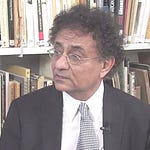Welcome to Emet — Truth. I'm Howard Lovy, and today we're tackling the infamous “Jewish Space Laser” theory and its deeper roots in antisemitism. I interviewed Mike Rothschild, author of Jewish Space Lasers: The Rothschilds and 200 Years of Conspiracy Theories. No, he's not one of those Rothschilds. We explore how this and other conspiracy theories often point back to the Rothschild family as the ultimate puppet masters. Our conversation, also featured in the Jewish Journal of Los Angeles, delves into the history and evolution of these theories and offers insights on combating these harmful narratives.
You can listen to our conversation by clicking the arrow at top, or read the transcripts below.
Howard Lovy: Well, first, tell me a little bit about your background, where you grew up, and when you first became fascinated by conspiracy theories.
Mike Rothschild: Sure. I grew up in the Chicago suburbs. Growing up, I didn't think much about my last name. I knew there was a wealthy Rothschild family, but I also knew we weren't related to them. It's not something I ever really thought about. In college, I became focused on conspiracy theories. I got really into the Art Bell Coast to Coast AM radio show. He talked about UFOs, crop circles, cattle mutilations—all the X-Files stuff. I never believed any of it, but I was fascinated by it as storytelling and wondered what mindset would drive someone to be attracted to something that repels most people. I moved to Los Angeles and worked as a screenwriter for a while, but it wasn't fulfilling. Around 2012, I started writing about conspiracy theories. At that time, conspiracy theories were still somewhat fringe but were starting to creep into the mainstream with things like the Obama birth certificate controversy. Then Trump happened, followed by 2016, QAnon, and COVID. Now it seems like everyone knows someone who believes in one of these theories, whether it's that Trump is the real president, COVID was created as a bioweapon, or the vaccine gives you blood clots. Almost all of these theories eventually connect back to the Jews, and the Rothschilds are seen as the ultimate Jews—the kings of the Jews. So it all coalesced for me into writing a book to figure out who this family is, and who they are not. That's really where it started.
Lovy: Right, right. You wrote this in your book, and others have said it too: almost all conspiracy theories are rooted in antisemitism, and almost all antisemitism is rooted in conspiracy theories. So, essentially, if you scratch any conspiracy theory down to its root, you'll find antisemitism. Is that a true statement?
Rothschild: I think that's very true. Many conspiracy theories are about who is really in control, who is running things, who are the string-pullers. Quickly, we devolve back to, "Well, it's the Jews; it's the wealthy, powerful Jews who are doing all the manipulation." They run all the front groups, think tanks, and banks. If you think it's the Jews, then somebody has to be in charge, somebody has to be controlling them. Very quickly, it turns into the Rothschilds.
Lovy: How did the Rothschilds themselves become such a focal point?
Rothschild: It really was the large amount of money they made during the Napoleonic Wars. They were charged with hiding the vast fortune of the Elector of Hesse, one of the principals of the rapidly disintegrating Holy Roman Empire. This was a huge amount of money that needed to be hidden from Napoleon's forces. Mayer Amschel Rothschild and his son Amschel essentially devised a system to move the money around and smuggle it across the English Channel. A lot of it was used to fund the effort against Napoleon. The Rothschilds made huge loans, earned interest on them, and sold bonds and gold. Within a couple of decades, they were one of the richest families in Europe. When you accumulate that amount of wealth that quickly and you're visibly Jewish, myths follow. And where myths go, conspiracy theories go.
Lovy: Right, right. Well, it's not that conspiracy theories didn't exist before the Rothschilds. They just kind of coalesced on this one family.
Rothschild: Oh, sure. Conspiracy theories have always existed. You can go back to the Great Fire of Rome, where people whispered that Nero had secretly set it to achieve some political aim. Jewish myths and tropes really coalesced around the Rothschilds in the 1800s. They were among the most visibly Jewish families; they never converted or assimilated. They were openly Jewish and had palaces, art collections, and racehorses. Their name was everywhere, and they had enough visibility that these theories followed them.
Lovy: Yeah, yeah. We call them theories, but aren't they really just excuses to give your pre-existing antisemitism a focus point? The antisemitism already existed, and this is just a respectable way to say, "Well, it's the Rothschilds," or these days, "It's George Soros."
Rothschild: Right, the beliefs were there, but organizing them around a smaller group helps to launder them. Before the 21st century, a lot of antisemitic material would say, "It's not all Jews; we love the Jews, we love Israel. It's just these wealthy European bankers causing all the trouble, and even other Jews should hate them." It's cloaked in a veneer of respectability: "It's not all Jews, just these few Jews over here."
Lovy: Right, right. And then there's the Trump variation, which I guess I don't have to tell you. It's almost this weird Philo-Semitism, where he believes every stereotype about Jews and thinks that's a good thing. "Of course, you're good with money," that kind of thing. Is this a newish kind of spin on the old conspiracy theory?
Rothschild: Some of it is, yes. It's very much taking these stereotypes and saying, "Oh, why wouldn't you want people to think you're good with money? Why wouldn't you want people to think you're smart?" At the end of the day, it's still a stereotype, and it's very easy to weaponize that in a negative way. It's just being done as a backhanded compliment.
Lovy: So, these days there's a lot of talk about right-wing versus left-wing antisemitism, and they all kind of meet at the ends of a horseshoe. But are you more likely to find Rothschild conspiracy theories on the right or the left?
Rothschild: Right now, it's the right. I would say that this major uptick in antisemitism we're experiencing is very much driven by the far right, particularly online influencers on the far right. But in the 1800s, it was very much in spaces that we would think of now as left-wing. The Socialist Movement had a great deal of antisemitism in it; the founder of anarchism had private notes talking about how the entire Jewish race needed to be either deported or exterminated. These were, as we would think now, progressive spaces, but they were extremely antisemitic. They were extremely anti-wealth, and much of that took the form of antisemitism.
Lovy: And you can find that on the left today, too. So, how much of this is online, all the crackpots talking to one another? How much does this really spill over into the real world?
Rothschild: Well, I think right now, we're seeing a great deal of spillover. We're seeing an uptick in public antisemitism. We're seeing Nazis marching in Florida. Here in Los Angeles, where I live, you're seeing banners over the 405 saying "Hitler was right." And you're seeing people like Kanye West and, indirectly, people like Elon Musk endorsing it. A lot of this stuff is online only, found in the worst places on the internet, but a lot of it is becoming very public. It's becoming acceptable, and it's losing that veneer of "we're not talking about the entire Jewish people, it's just these few industrialists." For a lot of these people, it's just all Jews, the entire Jewish population.
Lovy: Are you attributing this recent uptick in antisemitism to, at its root, the same kind of Rothschild conspiracy theories? You know, Jews as the secret puppeteers, that kind of thing?
Rothschild: A lot of it is, yes. Much of it has been repurposed over the last two decades for Soros. One of the things I do in the book is track the transition from the Rothschilds being the Jewish boogeyman to Soros being the Jewish boogeyman. Some of that starts in the '90s with the Lyndon LaRouche publishing empire, but it really goes into overdrive in 2004 with George Soros vocally opposing the Iraq War during a time of mutated patriotism. Anyone who was against Iraq was against America, and that was Soros.
If you go on social media and search for "Rothschild," you're going to get bombarded with memes, fake quotes, and conspiracy theories. It's maybe more Soros now because he is so current in the news cycle, but if you scratch even a little, you'll find the Rothschilds.
Lovy: That was going to be my next question. Is the Rothschild conspiracy theory too old-world now? Is it all about Soros, or do they go hand in hand?
Rothschild: They go hand in hand. You often get references to both of them working together—the Rothschilds being the puppet masters of Soros, or Soros controlling the Rothschilds, but both of them being controlled by an even more secretive family. There are all sorts of different ways they're connected. But if you go on social media and search for "Rothschild," you're going to get bombarded with memes, fake quotes, and conspiracy theories. It's maybe more Soros now because he is so current in the news cycle, but if you scratch even a little, you'll find the Rothschilds.
Lovy: Now, in the online world, I see lots of Jews who also believe George Soros is the source of all evil. I think a lot of it has to do with politics rather than antisemitism. But I'm finding that right-wing Jews say yes or no, this is a problem.
Rothschild: Well, there's perfectly legitimate disagreement with Soros. Just because you're Jewish doesn't mean you have to agree with everything Soros, the Rothschilds, or the ADL do. Jews argue amongst themselves all the time, especially around the dinner table. Nobody's going to agree on anything. But it's not so much the disagreement; it's how the disagreement is framed. You can criticize Soros, but when you start talking about Soros wanting to destroy humanity and enslave the Gentiles, that's really getting into antisemitic conspiracy theories. It's not really about Soros; it's about what rich Jews are doing to everybody else.
Lovy: Well, aren't you kind of spoiling the fun of conspiracy theories? Authors like Dan Brown have made a living out of them, and we all enjoy a good story. Isn't there a way to separate the fun of weaving these tales from hatred of Jews?
Rothschild: Well, I would never try to talk anybody out of being a believer in a conspiracy theory, and plenty of them are harmless—Bigfoot, UFOs, the big UAP stuff that's going on right now. That's really fun. There's nothing wrong with talking about that. The problem is when you let it start to take over your life and rewire the way you think. It quickly becomes not just a fun thing to talk about but something that's being done to us. And when you start talking about somebody doing something to you, well, somebody has to be in charge of that, somebody has to be funding it, and it quickly transitions into the same stereotypes about Jews.
Lovy: Okay, let's shift the subject to the Jewish space laser idea. I had never really connected that with the Rothschild conspiracy theory. Could you help me draw the Marjorie Taylor Greene Jewish space laser connection?
Rothschild: Sure. So this Facebook post by then-private citizen Marjorie Taylor Greene was in 2018. She was a couple of years away from running for Congress and was just a CrossFit mom in Georgia. She posted an incomprehensible conspiracy theory about a solar energy laser generator being used by Pacific Gas and Electric, Jerry Brown, and Dianne Feinstein's husband to clear land in rural California for a $77 billion high-speed railway. She starts talking about how one of the board members of PG&E is also an executive at Rothschild Inc., and oh, isn't that interesting? She never uses the phrase "Jewish space lasers" or the word "Jewish." But when you start talking about Rothschild Inc., people know what that means. You don't need to spell it out. The post disappeared, likely deleted, but a Media Matters researcher found it after January 6, after she was already sworn in. The idea of Jewish space lasers started really after that, in reaction to the Facebook post. And she didn't help herself by saying, "Oh, I didn't know the Rothschilds were Jewish. I'm not antisemitic; the real antisemites are the ones accusing me of it." So she didn't exactly cover herself in glory responding to it. But it was in line with many of the directed energy weapon conspiracy theories circulating around the California wildfires in 2018 and 2019.
Lovy: So, can anybody who holds these theories claim ignorance, saying, "Well, I didn't know they're Jewish," or "This isn't about the Jews; it's about a powerful family"? Is that really an excuse?
Rothschild: I don't think it is. If you're a member of Congress, you should probably know that the Rothschilds are Jewish. You don't need a self-serving explanation; you can just say, "I posted that, I didn't mean it, I'm sorry," and move on. But these people never back down. It's always someone else's fault. Much of conspiracy theorizing is blaming someone else, and Marjorie Taylor Greene is a prime example of an inability to take responsibility.
Initially, it was just a hashtag and memes, but blaming a wealthy Jewish family for a natural disaster is sinister. At worst, it's used to justify violence against Jewish communities. It normalizes blaming the Rothschilds, and we say, "Oh, she's just an idiot, it's a joke." Maybe it's not a joke; maybe we should take it seriously while also ridiculing it.
Lovy: We Jews like to laugh at the Jewish space laser idea. There are memes, and we're having a good laugh. But should we be more serious about it?
Rothschild: We should. Initially, it was just a hashtag and memes, but blaming a wealthy Jewish family for a natural disaster is sinister. At worst, it's used to justify violence against Jewish communities. It normalizes blaming the Rothschilds, and we say, "Oh, she's just an idiot, it's a joke." Maybe it's not a joke; maybe we should take it seriously while also ridiculing it.
Lovy: Right, it's like the modern-day version of Jews poisoning the wells. How do you fight this sort of attitude or stereotype that goes back thousands of years?
Rothschild: It's difficult to fight at scale because it's so ingrained. But we can recognize when someone is using Jewish tropes and push back against it. We can police our own conduct and that of people in our lives. It's not something you can deal with through tweets or government initiatives; it has to be something you take to heart.
Lovy: Speaking of tweets, it's ironic that Elon Musk, the richest man in the world, subscribes to this idea that some secret rich family is controlling things.
Rothschild: It is ironic. When Musk talks about the ADL being responsible for half of Twitter's value loss, it's just an old Jewish stereotype. It's blaming the Jews for business failures, saying the Rothschilds or the Cabal did it to me. It's part of the long history of Jewish scapegoating.
Lovy: So, at the very least, what do you hope people walk away with after reading your book?
Rothschild: I hope people recognize where these ideas come from. When a public figure blames Soros, the Rothschilds, or the ADL, it's not random. It has a long history. I want people to recognize these tropes and stereotypes and understand that many who use them don't want to be seen as anti-Semitic; they're just blaming powerful Jews for their problems.
Lovy: And you're certain you're not related to the Rothschild family?
Rothschild: Yes, I have a family genealogy book that traces my father's side to a different part of Germany. Also, no Rothschilds of the banking family emigrated to the U.S., so there's no branch for me to descend from.
Lovy: You realize that won't make a bit of difference to some people.
Rothschild: Absolutely, it won't matter. That's why the Rothschilds rarely talk about it. They'd have to prove a negative, which they can't. The accusers can't prove their claims either, but that's not how their minds work.













Share this post